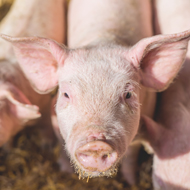
Study finds natural infection is the most efficient route
Swine flu vaccine testing must consider the route of infection, as this has a greater impact on results than previously thought, according to new research.
In experiments, scientists administer the influenza A virus (IAV) to pigs intra-nasally, intra-tracheally or by aerosol. Yet, few studies have compared the outcomes of the various methods.
Now, new research by The Pirbright Institute suggests that the route of infection and dosage does have a major effect on the outcome.
In the study, published in Veterinary Research, scientists analysed the amount of viral shedding and immune response from pigs after infection with a high and low dose of swine flu virus. Using intral-nasal and aerosol routes of administration, they also compared the outcomes with pigs infected through contact transmission - or the ‘natural route’.
The results show that the way the virus multiplies in the animal, and the immune response in naturally infected animals, differs from those of animals experimentally infected with different doses and methods.
The scientists found that pigs can be infected with a much lower dose of the virus when administered by aerosol rather than intra-nasally.
While animals infected intra-nasally needed a larger dose to establish an infection, the pigs produced more virus and were better able to transmit it once infected. In contrast, those infected with a high dose did not transmit it effectively.
The study also found that virus administered by aerosol was more effective than intra-nasally at reaching the lower respiratory tract (LRT).
The team say this suggests that virus replication in the LRT is better contained than the virus in the upper respiratory tract (URT) and less likely to be emitted as a result. 'This indicates that replication in the URT is the source of virus for both direct contact and airborne transmission,' they write.
Furthermore, the team found that natural infection by contact was the most efficient route - inducing a strong immune response, even when they exposed the animals to a low dose.
“Our comparison of intranasal, aerosol and contact infected animals shows that the route of infection and the dose of infectious virus have major effects on the outcome in terms of infectivity, viral shedding, immune response and pathology and should, therefore, be taken into consideration in experiments testing new vaccines or drugs,” explained Dr Elma Tchilian, group leader for swine influenza immunology.
“Furthermore, while the ‘natural’ contact route of infection may be the most effective, this approach requires the use of more animals and therefore a low dose of a virus using aerosol, may be the next best alternative in such studies”.



 The Veterinary Medicines Directorate (VMD) is inviting applications from veterinary students to attend a one-week extramural studies (EMS) placement in July 2026.
The Veterinary Medicines Directorate (VMD) is inviting applications from veterinary students to attend a one-week extramural studies (EMS) placement in July 2026.